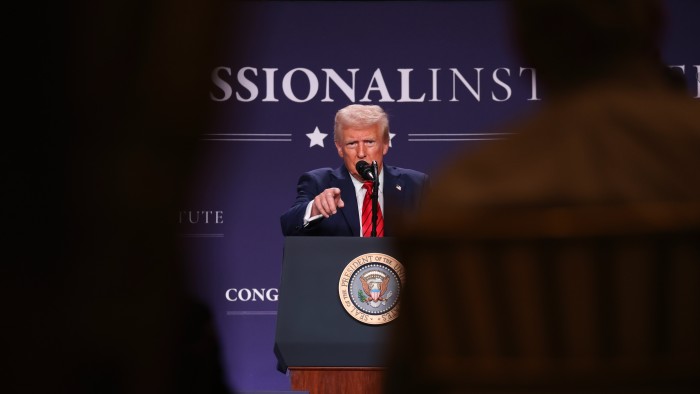One of the most diabolical things about President Donald Trump is how fast he moves. He’s put in place more than 40 executive orders already, and he’s only been in office for two weeks. This is surely part of an effort to confuse and scatter the Democratic resistance, which (like the media) has a hard time keeping up with it all.
But last week, Trump’s order to have the White House Office of Management and Budget “temporarily pause” grants, loans and federal financial assistance programmes to ensure they aligned with the president’s priorities sparked an immediate — and successful — response from Democrats. The move, which most likely violated a law preventing presidents from blocking funding that has already been authorised by Congress, would have affected things that really touch average people’s lives: kindergarten programmes, veteran’s benefits, workforce training, rural broadband access, etc.
So, Democrats took to social media, organised non-profit groups to flood the courts with lawsuits, and eventually a federal judge put a temporary block on the order, which the White House then rescinded.
There are several lessons to take from this. Below, my top five:
1. This was Trump’s first true attempt at authoritarianism, but it won’t be his last. Yes, there are other actions that have rightly been called out as likely “unlawful” — like the impoundment of foreign assistance dollars, and Inflation Reduction Act and Infrastructure Investment and Jobs Act funds. But the order to freeze all federal financial assistance was a step beyond because it touched domestic, congressionally approved funding in ways that were a litmus test for what the population was willing to put up with at home. The fact that he was willing to attempt something seemingly so illegal, and with such impunity, shows that there are no limits to what the White House will throw at the wall. They’ll keep doing just that, seeing what will stick legally.
2. Public outcry matters! Trump’s blitz of offensive actions can make people feel tired and go limp. But, as former secretary of labour Robert Reich pointed out last week, “history shows that early, strategic opposition is crucial to stopping authoritarian over-reach”. Trump doesn’t have an ideology, he has an ego. Public support (or the lack of it) means a tremendous amount to him, and public pressure can be used successfully to clamp down on him.
3. The block actually organised Democrats in a way that nothing else has yet. I’ve spoken to several groups of progressives that are now joining forces to file lawsuits against other potentially illegal actions, start letter- writing campaigns and talk to the press in a more joined up way. Labour unions are starting to get involved in the resistance, which is important since historically they are often crucial to any kind of authoritarian pushback.
4. We’re at a crucial pivot point in terms of how the next four years will play out. There are three ways things could go now. First, there might be a multiyear back and forth like what we’ve just seen, in which the administration tries to do illegal things and sees how far they can get, is pushed back again and again, and eventually end up as a more middle-of- the-road government. Second, they may go full bore to use the federal government to try and suppress state and individual rights (ironically, since the rightwing Supreme Court rulings of the last few years were all about trying to protect those rights), in ways that lead to imprisonment of those that oppose them. Which would lead to option three — a full on civil conflict in which Democrats and perhaps even some members of the Republican Party try to push Trump out on grounds of mental instability. This would require a huge public outcry of course, and possibly even result in violence in the streets.
5. How to avoid this? One thing that Democrats can and should do is to let both Supreme Court Chief Justice John Roberts and the administration itself know that if anything like the federal funds order happens again, they will go on strike. Meaning, they’ll assume that the president is officially in violation of the Constitution, attempting a kind of soft coup, and that they’ll no longer answer to the executive branch in any way. Nothing will get done in Congress. Government itself will grind to a halt. This kind of message might be best delivered by Chuck Schumer and Hakeem Jeffries together. The point here is to offset authoritarian creep.
Peter, what lessons do you take from the OMB debacle, and what should Democrats (and reasonable Republicans) do to combat Trump’s authoritarian actions?
Recommended reading
Peter Spiegel responds
Rana, I had a slightly different takeaway on the OMB memo, which at first looked like an extraconstitutional attempt to seize spending power — but very soon morphed into a tale of bureaucratic ineptitude, which has its own lessons for how we view the Trump White House.
Several news organisations have reported in recent days that the memo didn’t originate with the White House. In fact, it appears to have had no sign-off at the White House at all. Both The New York Times and The Atlantic, for instance, reported that it was authored by senior staff at OMB, who failed to run it by Trump’s praetorian guard before sending it across the federal government. The White House, they reported, was completely caught by surprise.
That in no way excuses what OMB officials tried to do. And surely it is in keeping with the messaging coming from Trump and Elon Musk’s government efficiency operation, which seems willing to run roughshod over such niceties as the US legal code and the good functioning of the federal government to achieve their policy ends. Indeed, The Washington Post had an equally chilling report on Friday about the resignation of one of the Treasury department’s most trusted senior staffers after Musk’s team attempted to get its hands on the federal government’s secure payment system.
The flurry of early action has led many to believe that Trump 2.0 is a significantly more efficient operation than Trump’s first tour in the White House. Susie Wiles, Trump’s capable chief of staff, has been able to pare back some of the first term’s chaos, and the four years in exile have allowed Trumpistas to get their ducks in a row before re-entering office. But the OMB memo illustrates that there is still a high element of mismanagement in the Trump operation — not so different from the clumsiness of the first term, when policies often went off the rails thanks to incompetent execution. (Remember “infrastructure week”? Me neither.)
All presidencies struggle to turn ideology into executable policy — and that includes those staffed by veterans of the bureaucratic trenches. What Trump 1.0 showed us was that administrative disorganisation can short circuit that process. So far, Trump 2.0 shows signs of getting better at it — but it remains to be seen if they can keep it up. The OMB memo saga has me doubtful.
Your feedback
And now a word from our Swampians . . .
In response to “How Silicon Valley turned China into its lifeline”:
“Why do we bother with confirmation hearings? They have devolved into mere performance art. The nominees appear to lie blatantly when confronted with evidence of their controversial positions (Kennedy, Hegseth, Patel), the Democrats shout at them to show their impotent disagreement, and the Republicans fall into line (Ernst, Tillis) unless they know they don’t provide the fourth vote to sink a nomination (Murkowski, Collins, McConnell).” — Garret FitzGerald
We’d love to hear from you. You can email the team on swampnotes@ft.com, contact Ed on edward.luce@ft.com and Rana on rana.foroohar@ft.com, and follow them on X at @RanaForoohar and @EdwardGLuce. We may feature an excerpt of your response in the next newsletter
Source link









